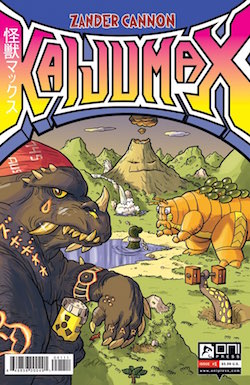Thursday Comics Hangover: Kaijumax loses its balance
(Every comics fan knows that Wednesday is new comics day, the glorious time of the week when brand-new comics arrive at shops around the country. Thursday Comics Hangover is a weekly column reviewing some of the books I pick up at Phoenix Comics and Games, my friendly neighborhood comic book store.)
“We should not be tolerating rape in prison, and we shouldn’t be making jokes about it in our popular culture,” President Obama announced in a speech about criminal justice reform earlier this month, adding, “that is no joke. These things are unacceptable.”
He’s right, of course. In addition to being simultaneously cruel and facile, prison rape jokes are one of the last safe spaces for homophobia in popular comedy. And still, most comedies about prison or crime include at least one prison rape joke. What does it say about us as a society — especially a society with the largest prison population in global history — that we’re okay with this?
And what does all this have to do with comic books?
I’ve been reading and enjoying Zander Cannon’s new comic from Oni Press, Kaijumax, an ongoing series about giant, Godzilla-style monsters thrown into prison for trying to destroy cities. The “prison” is an idyllic island far from civilization, and the guards are Ultraman-like humans. The book demonstrates a bone-deep understanding of kaiju cliche and is packed with little in-jokes for people who’ve spent way too many hours of their lives watching adults in rubber lizard suits destroy cardboard cities.

But the kicker is that the kaiju all act recognizably human. These are monsters that worry about their families back home. They try to talk to the guards about life. They have regrets. The absurd premise smacks into the silly drawing style and the convincingly portrayed emotions, and the reader isn’t quite sure how to land at the end of each issue. It’s a pleasant kind of discombobulation.
But the latest issue of Kaijumax, issue #4, opens with a sequence that throws the story’s balance off-kilter. One of the kaiju, the buglike Electrogor, is bathing in a waterfall. Another kaiju, a lizard-looking monster with a scorpion tail named Zonn, approaches him and starts talking. Soon, Zonn is holding the struggling Electrogor down and piercing his carapace with his tail-stinger. The scene plays way too close to the reality of prison rape, and it flat-out ruins Cannon’s juggling act.
To Cannon’s credit, he doesn’t play the scene for laughs. And he shows the aftereffects of violence: Electrogor suffers from the violence for the rest of the issue. He’s delivered, crying and vomiting, to the island’s hospital where he tells the nurse, “T-terrible thing happened me.” This isn’t a Chris Tucker punchline tossed into the end of a buddy cop movie. But is it necessary?
In the letter column of this issue of Kaijumax, Cannon addresses the scene head-on. When a reader writes in to say that “the rape-ish jokes and pretend-[racial] slurs make me uncomfortable and I think there’s kind of a disconnect between the more cutesy art-style and pretty serious subject matter. Is this uncomfort [sic] and stylistic disconnect intentional or am I just too sensitive you think[?]”
Cannon replies,
I do intend there to be a bit of an uncomfortable edge to it. My hope is that it’s not too off-putting; I want the mismatch between the prison harshness and the monster-ridiculousness to be humorous, not mean-spirited. I acknowledge that I’m walking an edge with some of the call-outs to racism and sexual assault, but the book will always stay more or less in the PG realm; everything has a monster-movie equivalent. Hopefully the vague sense of unease it gives you now will be as bad as it gets. This issue is the one that I was (am?) worried about being slightly over-the-top in terms of what it was about, but I’m too close to it to know if it crosses the line. I don’t think so, since the nature of Electrogor’s assault is firmly in the monster-movie realm and veers very wide of what I expect would upset someone. All that being said, of course, not every comic is for everyone.
Clearly he’s put a lot of thought into this, but as a reader, I think Cannon is wrong; in this case, the scene plays out too closely to the kind of scenes we see on TV and in movies on a regular basis. By relying on the shorthand that entertainers have used for decades — the shower scene has played out hundreds of times in hundreds of ways — Cannon becomes a participant in a long and shameful tradition, even as he tries to transcend it.